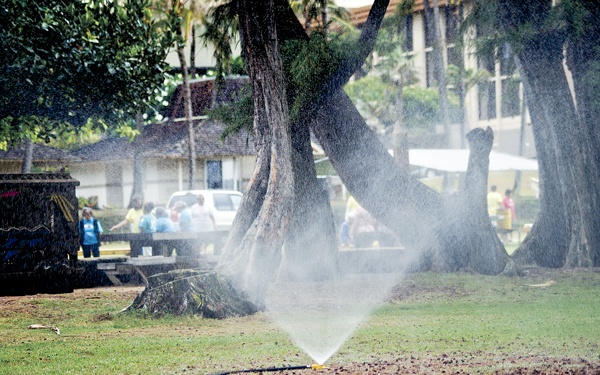LIHU‘E — Maintaining and installing water efficient irrigation systems is one of the most effective ways to reduce drinking water waste. Each day 50 percent or more of potable water is squandered for landscape irrigation instead, according to Chris Dacus,
LIHU‘E — Maintaining and installing water efficient irrigation systems is one of the most effective ways to reduce drinking water waste. Each day 50 percent or more of potable water is squandered for landscape irrigation instead, according to Chris Dacus, president of Landscape Industry Council of Hawai‘i.
“Today you can find efficient appliances, efficient cars and many other innovative products that save a lot of energy and reduce waste,” Dacus said. “But what about water? There has been a drought increase in Hawai‘i in the past 10 to 20 years and that is why we need to address this issue now. I feel it’s not being addressed enough yet.”
A poorly maintained or installed irrigation system along with badly timed watering sessions and negligent runoffs are problems that Dacus has been working on solving since 1986, when he and associates started LICH, a statewide alliance representing Hawai‘i’s landscape trade associations.
“One of the big problems is that half of the potable water is used outside, for other purposes than indoor uses like drinking or cooking,” Dacus said.
In 2010, landscape architects, irrigation installers, landscape maintenance, irrigation distributors, the Hawai‘i Department of Land and Natural Resources, the Honolulu Board of Water Supply and large land managers were brought together to come up with new plans to develop irrigation water conservation measures.
Dacus has been working for the past 26 years at reducing the amount of household water wasted. Today, Hawai‘i’s landscape industry is one of the fastest growing and largest segments of the green industry with an economic impact of over $520 million annually and full time employment of over 11,000 landscape professionals.
Dacus looked at the best water saving measures throughout the country, especially in Arizona and California where water ordinances are extremely strict. He then submitted the best ways to reducing water waste to DLNR, which adopted the measures soon after.
“We are going to have to do much better with water conservation,” Dacus said. “There are many huge opportunities still, but we must hurry.”
After extensive research and working in collaboration with major companies, LICH has just released a free 16-page color brochure illustrating 26 water conservation measures.
LICH is now working on the implementation measures for advocacy and industry outreach.
Leadership in Energy and Environmental Design (LEED) integration, professional conservation training and certification, consumer rebate incentives and research of water efficient irrigation equipment in actual Hawai‘i conditions.
“We don’t value water enough,” Dacus said.
“Water is too cheap, that’s why we don’t respect it.”
According to the Pacific Disaster Center, droughts in Hawai‘i have become more severe over the past 20 years, with Maui having been designated a primary natural disaster area in 2006 due to the lowest amount of water ever available on the island.
Chris Dacus may be reached via email at chris.dacus@gmail.com.


